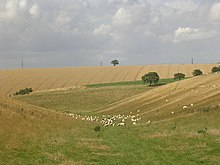The Wolds

The Wolds is a term used in England to describe a range of hills which consists of open country overlying a base of limestone or chalk.[1]
Geography
The Wolds comprise a series of low hills and steep valleys that are in the main underlain by calcareous (chalk and limestone) and sandstone rock laid down in the Cretaceous and Jurassic periods. One exception to this is the North Leicestershire /South Nottinghamshire Wolds, which are underlain by sometimes chalky glacial till ('Oadby Till'). The characteristic open valleys of the Wolds were created during the last glacial period through the action of glaciation and meltwater.[2] The chalk that underlies the Chalk Wolds Landscape Character Type extends from the Yorkshire Wolds to the south coast of England in East Sussex and in Dorset.[2] Geologically, the Lincolnshire Wolds is a continuation of the Yorkshire Wolds which runs through the East Riding of Yorkshire; the point at which the ranges of hill crosses the Humber is known as the Humber Gap.[2]
Etymology
The name Wold is derived from the Old English wald meaning "forest", (cognate of German Wald, but unrelated to English "wood", which has a different origin).[1] Wold is an Anglian form of the word, as in other parts of England, different variations can be found.[3]
Over the years the meaning changed from "forest" to "high forest land". When the forests were cleared, the name was retained and applied to upland areas in general. This was particularly true in the Cotswolds, the Lincolnshire Wolds and also the Yorkshire Wolds.[1]
Example of Wolds in literature
"Westward before her rose fold upon fold of the encircling hills, piled rich and golden."
Description of the Yorkshire Wolds by Winifred Holtby.[4]
"On either side the river lie/Long fields of barley and of rye,
That clothe the wold and meet the sky;"
First lines of The Lady of Shalott by Alfred Tennyson
"Once in the wind of morning
I ranged the thymy wold;
The world-wide air was azure
And all the brooks ran gold."
From A Shropshire Lad, by A. E. Housman
See also
- The Weald (West Saxon variation)
Citations
References
- Gelling, Margaret (2000). Place-Names in the Landscape. London: Phoenix. ISBN 1-8421-2264-9.
- Holtby, Winifred (1981). Anderby Wold. London: Virago Press. ISBN 978-1-84408-791-4.
- Onions, C. T.; Friedrichsen, G. W. S.; Burchfield, R. W., eds. (1966). The Oxford dictionary of English etymology. Oxford: Oxford: Clarendon Press. OCLC 251553598.
